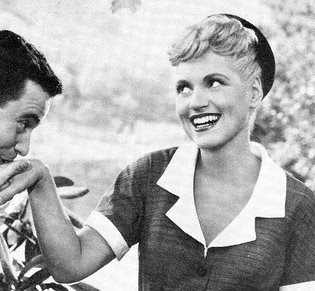“Good-bye, Name-for-yourself…”
A while back I watched It Should Happen to You, a 1954 comedy directed by George Cukor. The film is often cited as being Jack Lemmon‘s career-launching vehicle, but Judy Holliday is the one to watch.
 Holliday plays Gladys Glover, a pretty young woman who came to Manhattan two years earlier to seek fame and fortune. But when we meet her, she has just lost her modeling job because of a 3/4″ increase in hip size.
Holliday plays Gladys Glover, a pretty young woman who came to Manhattan two years earlier to seek fame and fortune. But when we meet her, she has just lost her modeling job because of a 3/4″ increase in hip size.
She’s kind of fed up with everything as she wanders through Central Park, annoys various people, and then becomes part of some documentary footage being shot by Jack Lemmon’s character, Pete Sheppard.
Naturally, Pete falls for Gladys, but never has a more stuck-up character fallen for a creative genius. Yes, I’m talking about Lemmon’s character as the stuck-up guy and Holliday’s Gladys Glover as the genius.
See, Gladys realizes something that the rest of the world – even Andy Warhol – doesn’t catch up to until much later: the importance of personal branding (or, alternately, securing one’s 15-minutes of fame). She succeeds in getting what she wants most: that her name become a household word. (See this Wikipedia entry for a succinct plot summary and description.)
But since the movie is from the early 50s, it’s inevitable that a man should bring Gladys “down to earth,” by reconciling her at the end of the movie to an ordinary life in an ordinary setting. It’s pretty obvious that they’re not going to settle down in Manhattan – they’ll go back to her upstate hometown or live somewhere just outside the city. In Westchester, no doubt.
Admittedly, Gladys Glover is a bit of a kook – but then, so was Audrey Hepburn’s Holly Golightly, who at least becomes iconic. In the end of course even Holly Golightly doesn’t soar to freedom, although it’s less likely that she ended up in as conventional a relationship with George Peppard’s Paul Varjak as Gladys must with Lemmon’s Sheppard. 
Gladys – such a 50s name! – can’t stay kooky. Her initial act – renting a giant billboard that overlooks Columbus Circle just so she can emblazon it with her personal name – makes Lemmon’s character think she’s certifiable. “After all, no one hires display space just to put their name on it!” he splutters.
Or, how about his other “it-goes-without-saying” pronouncement, which certainly resonates today: “What most people – real people – want is privacy!”
“Not me,” the kook (aka Gladys Glover) replies.
He enjoins her to “learn to be a part of the crowd,” but that prospect just depresses her.
And so, Gladys ends up on a proto-typical reality show circuit, where a public-at-large speculates about her identity. “All she’s got is nerve,” someone says. And “that’s all you need these days” is the reply.
As the film builds to its climax (Gladys unhappy with the emptiness of fame) before the final denouement (Gladys finding happiness in being just another average girl who finds happiness with an average guy in an average relationship set in what will probably be an average suburban subdivision), her handlers (for she has indeed acquired professional handlers along the way) set out to exploit her “unusualness.” How? By showing that the average American girl is …unusual.
That right there is another brilliant foreshadowing of every marketing angle to hit the pike since this film was made.
But is there a clear-cut alternative? Lemmon’s character seems to think so, but its price-tag (the woman subordinating herself to her man) is unacceptably steep.
Sheppard’s otherwise conventional advice to Gladys, who wants to make a name for herself, was enlivened only by this: “It isn’t just making a name, it’s making a name stand for something.” That’s what Gladys latches on to when her creative quest for fame goes wrong.
When she says, “Good-bye, name-for-yourself,” and packs it in, she expresses how difficult it is to keep your name as yours once it circulates as common stock. Identity and privacy, particularly control over privacy, are clearly and intricately linked.
It’s too bad she opts for merging her identity into Sheppard’s. By the end of the film, I sort of hoped that the marriage wouldn’t last.
No Comments yet
Sorry, the comment form is closed at this time.